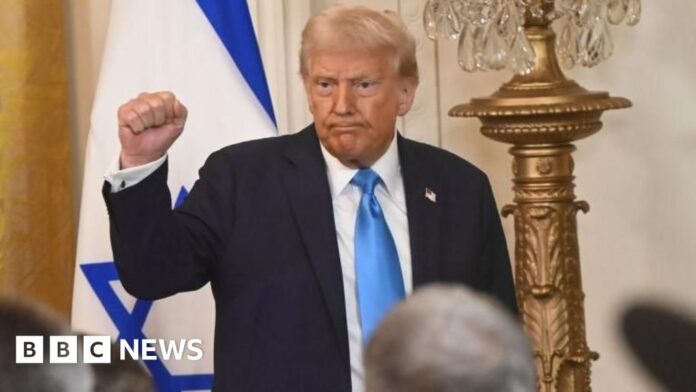When a real-estate developer becomes the US president, don’t be surprised if American foreign policy includes a heavy helping of real-estate development.
That’s probably the biggest conclusion to draw from Donald Trump’s stunning proposal for the US to take over Gaza and turn it into a resort for all the people of the world to enjoy – a “Riviera of the Middle East”, in his words.
It also presents the latest iteration of a question that has persisted as long as Trump has been involved at the highest level of American politics.
Should Trump’s Gaza development plan, which includes the resettlement of more than two million Palestinians and US “ownership” of the contested lands be taken literally or seriously? Both, or neither?
Trump’s proposal flies in the face of the deeply held wishes of the Palestinian people and has been summarily rejected by the Arab nations that would have to play an integral part in resettling those displaced from war-torn Gaza.
It has also triggered howls of protest from the international community, as well as the president’s domestic critics in the Democratic Party.
“Developing war-torn land like a Trump golf resort isn’t a peace plan, it’s an insult,” said Democratic Congressman Troy Carter of Louisiana. “Serious leaders pursue real solutions, not real estate deals.”
Even some of Trump’s most steadfast Republican allies have seemed wary of the president’s suggestion that US forces could occupy Gaza, clearing rubble and removing unexploded Israeli ordinance.
“I think most South Carolinians would probably not be excited about sending Americans to take over Gaza,” Lindsey Graham, who represents South Carolina in the US Senate, said on Wednesday. “I think that might be problematic, but I’ll keep an open mind.”
Senator Rand Paul of Kentucky was even more blunt.
“I thought we voted for America First,” he wrote on X. “We have no business contemplating yet another occupation to doom our treasure and spill our soldiers’ blood.”
Paul highlights what has been an apparent contradiction in the early weeks of Trump’s presidency. While Trump has culled US foreign aid and pledged to focus on American domestic concerns, he has also leavened his remarks with talk of American expansionism.
His interest in acquiring Greenland is persistent and, according to administration officials, deadly serious. His talk of making Canada the “51st state” and retaking the Panama Canal is no longer being treated like a joke.
And now Trump, one of the most vocal right-wing critics of the US invasion and reconstruction of Iraq, is suggesting a new Middle East nation-building project.
As for the specific ideas behind Trump’s latest proposal, they may be shocking for some but they shouldn’t be too much of a shock.
The president spoke of “cleaning out” Gaza and resettling Palestinians in remarks to reporters on Air Force One just days after his inauguration.
During the presidential campaign, he told conservative radio host Hugh Hewitt that Gaza could be “better than Monaco”, but that the Palestinians “never took advantage” of their “best location in the Middle East”.
This also isn’t the first time Trump has viewed a seemingly intractable foreign policy situation as an exciting business opportunity.
During meetings with North Korea’s Kim Jong Un in 2018, President Trump marvelled at the hermit nation’s “great beaches”, which could someday have the “best hotels”.
Those ambitious dreams have been shelved – and Trump’s Gaza vision, which would require a significant commitment of American blood and fortune at a time when it’s paring back its foreign involvements, will almost certainly meet the same fate.
But Trump’s Gaza proposal does represent a marked shift in America’s commitment to a two-state solution to the Palestinian situation.
A generous interpretation of the American strategy is that it is designed to shake up the Middle East powers and force them to commit more of their own resources, and political will, to finding a long-term solution to the situation in Gaza.
But such a strategy would come with risks.
The multi-step Israeli-Hamas ceasefire hangs in the balance. The Palestinians could view Trump’s comments as a sign that the US is not interested in a lasting peace, while Israeli hard-liners who are a key part of Benjamin Netanyahu’s governing coalition may celebrate it as Trump’s green light for further expanding Israeli settlements.
Arab nations – some of whom worked with the first Trump administration to produce normalised relations with Israel in the Abraham Accords – may doubt whether Trump in his second term can be a reliable negotiating partner.
There are now years of evidence that Trump’s focus can shift on a moment’s notice. In the end, he could abandon all attempts at brokering a durable Middle East peace, blaming the Palestinians and their Arab allies for what he might view as their decision to reject the prospect of a better life removed from past conflicts.
Then it’s back to trade wars with Canada, condominiums in North Korea, mining sites in Greenland or some other challenge that does not divide his own party or require solving centuries of animosity with seemingly intractable ancestral concerns.
